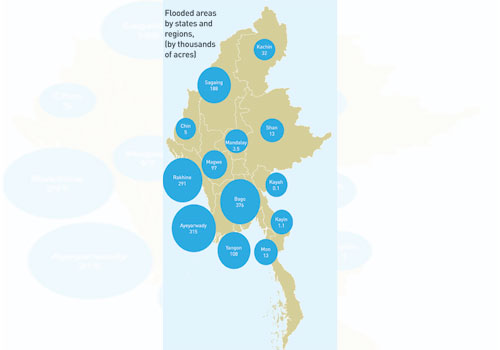Surging demand due to destruction of paddy fields during recent flooding causes a record spike in rice prices in Myanmar
16 ตุลาคม 2558
Surging demand following thewidespread destruction of paddy fields during the recent flooding has forced a record spike in prices, say the Myanmar Rice Federation and local paddy and rice traders in Nay Pyi Taw.
Since September, the price per 100 baskets of ManawThukha old crop in Nay Pyi Taw has risen from under K700,000 to nearly K900,000 as of the second week of October, said KoMyo Lin Aung, a paddy trader in Pyinmana, on October 13.
“A broker this morning who came looking for paddy told me the market price today was K850,000,” he said.
U Nay Soe, a rice miller in Pyinmana, Mandalay Region, said ManawThukha paddy was priced at K900,000 per 100 baskets. “This is a record high,” he said, adding that the reason for the rise could also relate to the election.
In the rice-growing Ayeyarwady Region, ManawThukha is priced K650,000, rising to K750,000 in Nay Pyi Taw. U Nay Soe said transportation and general expenses accounted for the difference.
U MyoAungKyaw of the Myanmar Rice Federation said paddy prices usually rise as the old crop runs out and before the new crop comes to market.
“We’re between the old and the new market now, so prices can be difficult to predict,” he said.
Dismissing the election as a cause of the rise, U MyoAungKyaw said it was the result of restrictions in supply caused by the widespread destruction of farmland by the flooding.
“In the rainy season, the flooding of farmland decreases yield. Traders know they can profit by storing rice. That raises demand,” he said.
A single bag of ManawThukha (one-and-a-half baskets) rose from K23,000 earlier this month to K27,000 or K28,000 in the second week of October, said U Nay Soe said.
High rice prices were a cause of concern for low-paid workers, said U Zaw Win of the City Development Committee.
U MyoAungKyaw said prices would fall as the new summer paddy came on the market in sufficient quantity to make up for the losses caused by floods. He cautioned that no action should be taken to rein in prices even if they rise further.
“Price-capping has only a temporary effect, then things go back to the way they were. If prices are allowed to rise, more farmers will have the incentive to grow paddy, bringing prices down again as the quantities increase,” he said.
Bran and broken rice prices have also risen. Last year, a bag of soft bran went for K6000, but has doubled this year to K12,000. A bag of broken rice has gone in the past year from K10,000 to K17,000. A year ago, 100 baskets of ManawThukha sold for K450,000.
Source: http://www.mmtimes.com/index.php/business/17033-devastating-floods-send-paddy-prices-skyward.html











